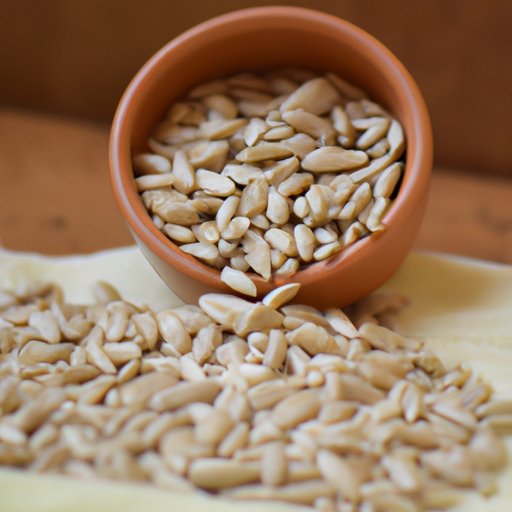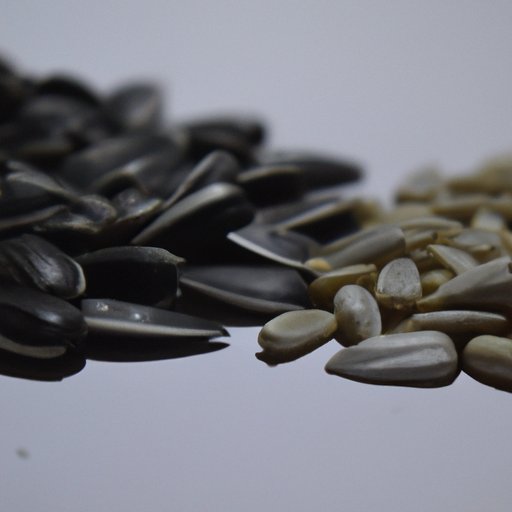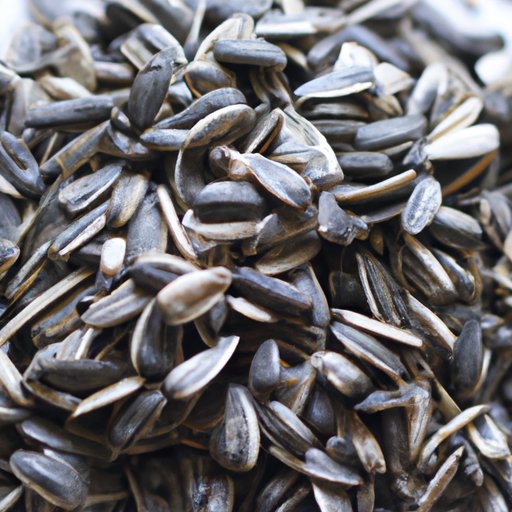Introduction
Sunflower seeds make a delicious snack that is packed with nutrients. They are a popular choice among athletes, health-conscious eaters, and anyone looking for a tasty treat. But are they really good for you? In this article, we’ll explore the health benefits of sunflower seeds, as well as how to incorporate them into a healthy diet.

Nutritional Benefits of Sunflower Seeds
Sunflower seeds are an excellent source of essential vitamins and minerals. They contain vitamin E, B vitamins, magnesium, phosphorus, copper, selenium, zinc, and manganese. They’re also a great source of protein, fiber, and healthy fats.
Exploring the Health Benefits of Sunflower Seeds
Sunflower seeds are linked to a number of health benefits, including heart health, diabetes management, bone health, and weight loss. Studies have shown that sunflower seeds can reduce cholesterol levels, lower blood pressure, and improve insulin sensitivity. They’re also rich in antioxidants, which can help protect against cancer and other diseases.
In addition, sunflower seeds are a great source of calcium, which is important for bone health. Eating sunflower seeds regularly can help prevent osteoporosis and other bone-related conditions. Finally, because they’re high in protein and fiber, sunflower seeds can help with weight loss. They’re filling and can help keep you feeling full longer, making them a great snack for people trying to lose weight.
How to Incorporate Sunflower Seeds into a Healthy Diet
There are plenty of ways to incorporate sunflower seeds into your diet. You can add them to salads, sandwiches, stir-fries, and other dishes for extra crunch and flavor. You can also roast or toast them for a tasty snack. You can also find sunflower seed butter, which is a great alternative to peanut butter.
You can also find recipes online for things like sunflower seed granola, energy bars, and muffins. There are also savory recipes like sunflower seed pesto and hummus. If you’re looking for a quick and easy snack, try adding a handful of sunflower seeds to your yogurt or oatmeal.

How to Choose the Healthiest Sunflower Seed Brands
When choosing sunflower seeds, it’s important to look for organic, non-GMO varieties. Organic sunflower seeds are grown without the use of pesticides or chemical fertilizers, which can be harmful to your health. Non-GMO sunflower seeds are not genetically modified, so they’re free from potentially harmful chemicals.
It’s also important to look for unsalted sunflower seeds. Many brands add salt to their sunflower seeds, which can increase your sodium intake. Be sure to check the label for added ingredients before purchasing.
Are Sunflower Seeds Good for Weight Loss?
Sunflower seeds are a great snack for people trying to lose weight. One ounce of sunflower seeds has around 160 calories, making them a relatively low-calorie snack. Additionally, sunflower seeds are high in protein and fiber, which can help you feel fuller longer and reduce cravings.
However, it’s important to keep portion sizes in mind when snacking on sunflower seeds. Eating too many can lead to weight gain, so it’s best to stick to one serving at a time.

Sunflower Seeds: A Delicious Source of Essential Vitamins and Minerals
Sunflower seeds are an excellent source of essential vitamins and minerals. They’re especially high in vitamin E, which is a powerful antioxidant that can help protect cells from damage. They’re also a great source of B vitamins, which are important for metabolism and energy production. Sunflower seeds are also high in magnesium, which is essential for maintaining healthy bones and muscles.
Common Health Questions Answered: Are Sunflower Seeds Healthy?
Overall, sunflower seeds are a healthy snack option. They’re packed with nutrients and offer a variety of health benefits. However, it’s important to choose organic, non-GMO varieties and avoid salted sunflower seeds. Additionally, it’s important to watch your portion sizes, as eating too many can lead to weight gain.
Conclusion
Sunflower seeds are a tasty and nutritious snack. They’re a great source of essential vitamins and minerals, as well as protein, fiber, and healthy fats. They’re linked to a number of health benefits, including heart health, diabetes management, bone health, and weight loss. To get the most out of sunflower seeds, look for organic, non-GMO varieties and watch your portion size. With the right preparation, sunflower seeds can be a delicious and nutritious part of a healthy diet.
(Note: Is this article not meeting your expectations? Do you have knowledge or insights to share? Unlock new opportunities and expand your reach by joining our authors team. Click Registration to join us and share your expertise with our readers.)
